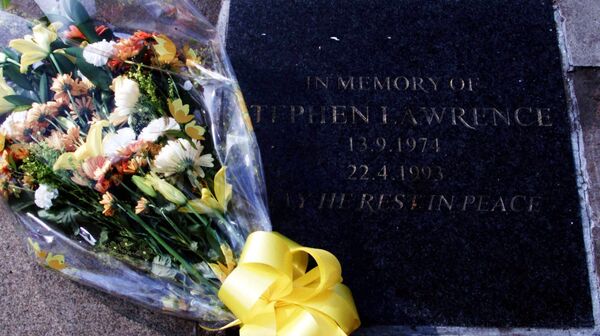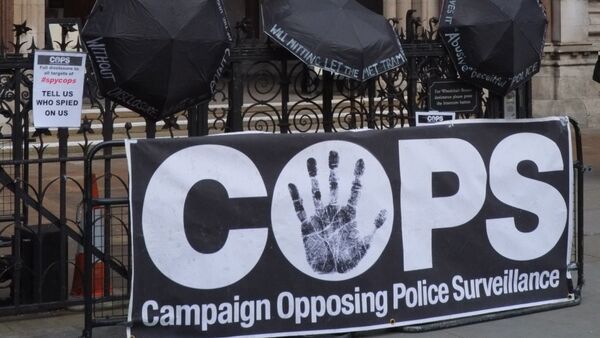Seven days later, his body was found floating in the Thames. From the outset, the Reel family maintained he was the victim of a racist murder, and police took neither his disappearance nor death seriously because he was Asian — a charge authorities deny.
Whatever the truth of the matter, recalling those dark days is still excruciating for his mother Sukhdev in 2018, despite the passage of so many years.
"At first, they simply refused to accept he'd died, suggesting to us he'd run away from home — perhaps because we'd been trying to force an arranged marriage on him. One officer, winking at my husband, even advised us he might be gay. We had to do all the searches ourselves, and kept looking for him for an entire week. We urged officers again and again to search the Thames, but when we finally found him in the river, there was no police activity at all there," Sukhdev told Sputnik.
Once Ricky's death was confirmed, police denials evolved — he'd simply fallen and drowned in the river while drunkenly attempting to urinate, and there was no violent racial factor in his death of any kind, they claimed. Perhaps unsurprisingly, their explanation wasn't accepted by many, least of all his grieving loved ones — and in Sukhdev's own words, they "refused to go away".
Not Giving Up
Ricky's family and friends, with support from members of the public, established a justice campaign, seeking to uncover just what happened to Ricky that night, and expose institutionalized racism within the Metropolitan Police. The group quickly gained a high profile, thanks in part to support from the Stephen Lawrence Family Campaign.
In 1999, their efforts were partially rewarded when the then-Police Complaints Authority launched an examination into police handling of the case — it concluded there'd been "weaknesses and flaws" in the police's approach, and criticized three officers for neglect of duty. In particular, it revealed potentially significant CCTV footage was destroyed while other tapes weren't seized in time, Ricky's friends weren't shown pictures of known local racists to see if any matched the youths who'd abused them, and no forensic analysis was conducted on the area where investigators concluded Ricky fell into the river.
Later that year, an inquest jury returned an open verdict on Ricky's death — despite officers testifying it was "unlikely" physical assault and/or a racially motivated attack played a role in the tragedy, the family's solicitor Michael Mansfield presented evidence Ricky had fallen into the river backwards, and had bruises on his back indicative of a recently incurred beating.
Moreover, coroner Dr. John Burton told the inquest he'd received evidence that key witnesses — and their families — had faced intimidation, and been pressured not to testify.
Despite this litany of critical failings, as of May 2018 no disciplinary action has been taken against any officers involved, no arrests have been made, and the police remain committed to a narrative of misadventure.
Under Surveillance
In 2014, John McDonnell, Sukhdev's local MP, was contacted by police — they wished to arrange a meeting with him, the Reel family and Suresh Grover, a leading human rights campaigner and adviser to the family's still ongoing justice campaign.
Force representatives had shocking information to impart — McDonnell, the Reel family and their campaign had all been subject to covert police surveillance, with undercover operatives regularly attending the group's meetings.
"It hit us very hard, brought back so many terrible memories. I felt then I finally understood why Ricky's killers hadn't been caught — exactly when we were urging additional police resources be dedicated to investigating our son's death, resources had actually been invested in spying on me and my family. They didn't care about him, they were only concerned about what my family and our campaign was doing," Sukhdev told Sputnik.
"In 2015, I was invited by Scotland Yard to view the reports police spies had compiled on us. I was elated — but when I saw them, there was nothing there. Almost all the content had been redacted. Our hopes were raised so high, and to receive nothing left us still wondering. Who was spying on us? What information did they collect? Why? The police kept these reports for 21 years!" she rages.
Moreover, revelations about police infiltration of other justice campaigns — 18 instances have been confirmed so far, with potentially others yet to be exposed — strongly suggest spying on the Reel family was far from unintended, and may have had sinister motivations.
For instance, Peter Francis, who under the pseudonym ‘Pete Black' infiltrated 12 separate justice campaigns 1993 —1997, has claimed part of his mission when spying on the Stephen Lawrence Family Campaign was to find incriminating information about the group, and Stephen's family and friends, in order to discredit it and them in the eyes of the public.
"Had I have found anything detrimental, the police using the media would've used that information to smear the family. My superiors were after any intelligence of that order. That was made clear to me. The Lawrences were not unique in this. I suggest journalists read some of the information leaked to the press at the time about these campaigns and seriously question where they came from and why. They should also look at how some of the tabloids reported the Lawrence death very early on," Peter has alleged.

It has since been revealed several undercover officers infiltrated the Stephen Lawrence Family Campaign, among them 'David Hagan'. An official review into the officer's activities revealed he gathered personal details about Stephen's parents Doreen and Neville, including personal information about the state of their marriage. Perhaps significantly, Hagan was also one of the officers who spied on the Reel family.
No Choice
On May 17 2018, Sukhdev met with John Mitting, the former High Court judge chairing the Undercover Policing Inquiry (UCPI). She left the encounter with decidedly mixed feelings — while he listened to her concerns, pledged to release files held on her and her family ‘sooner rather than later', and admitted for the first time more than one undercover was involved, Sukhdev isn't overly optimistic.
"It's unclear whether the files will be uncensored, and he said he needs to risk assess whether he can provide the names of the officers or not. I pose no risk to anyone's safety. I and other core participants in the UCPI want an independent panel to vet Mitting's work — and he's refusing. He needs to stop prioritizing needs of officers over the needs of people like me who've been damaged by their spying. We all need full disclosure. Without it, we'll never know what actually happened to us," Sukhdev told Sputnik.
"I'm sympathetic to the concerns of other core participants — they feel they're not getting anything out of the inquiry. But whatever the UCPI reveals, I'm going to keep searching. My son was murdered, and I need to know how, why and by whom. Police say the door is open, and it's up to us to find new evidence and present it to them — and we will. We have no choice. When Ricky died, his mother died too," Sukhdev concludes.

